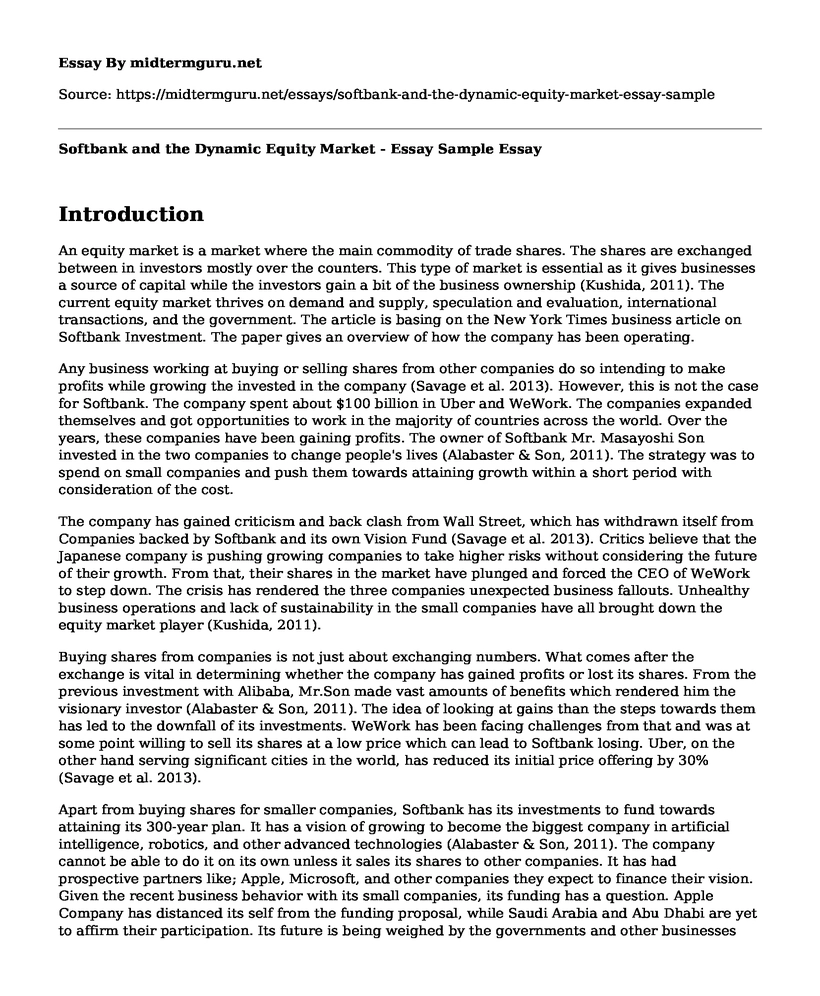Introduction
An equity market is a market where the main commodity of trade shares. The shares are exchanged between in investors mostly over the counters. This type of market is essential as it gives businesses a source of capital while the investors gain a bit of the business ownership (Kushida, 2011). The current equity market thrives on demand and supply, speculation and evaluation, international transactions, and the government. The article is basing on the New York Times business article on Softbank Investment. The paper gives an overview of how the company has been operating.
Any business working at buying or selling shares from other companies do so intending to make profits while growing the invested in the company (Savage et al. 2013). However, this is not the case for Softbank. The company spent about $100 billion in Uber and WeWork. The companies expanded themselves and got opportunities to work in the majority of countries across the world. Over the years, these companies have been gaining profits. The owner of Softbank Mr. Masayoshi Son invested in the two companies to change people's lives (Alabaster & Son, 2011). The strategy was to spend on small companies and push them towards attaining growth within a short period with consideration of the cost.
The company has gained criticism and back clash from Wall Street, which has withdrawn itself from Companies backed by Softbank and its own Vision Fund (Savage et al. 2013). Critics believe that the Japanese company is pushing growing companies to take higher risks without considering the future of their growth. From that, their shares in the market have plunged and forced the CEO of WeWork to step down. The crisis has rendered the three companies unexpected business fallouts. Unhealthy business operations and lack of sustainability in the small companies have all brought down the equity market player (Kushida, 2011).
Buying shares from companies is not just about exchanging numbers. What comes after the exchange is vital in determining whether the company has gained profits or lost its shares. From the previous investment with Alibaba, Mr.Son made vast amounts of benefits which rendered him the visionary investor (Alabaster & Son, 2011). The idea of looking at gains than the steps towards them has led to the downfall of its investments. WeWork has been facing challenges from that and was at some point willing to sell its shares at a low price which can lead to Softbank losing. Uber, on the other hand serving significant cities in the world, has reduced its initial price offering by 30% (Savage et al. 2013).
Apart from buying shares for smaller companies, Softbank has its investments to fund towards attaining its 300-year plan. It has a vision of growing to become the biggest company in artificial intelligence, robotics, and other advanced technologies (Alabaster & Son, 2011). The company cannot be able to do it on its own unless it sales its shares to other companies. It has had prospective partners like; Apple, Microsoft, and other companies they expect to finance their vision. Given the recent business behavior with its small companies, its funding has a question. Apple Company has distanced its self from the funding proposal, while Saudi Arabia and Abu Dhabi are yet to affirm their participation. Its future is being weighed by the governments and other businesses related to its sustainability.
References
Alabaster, J., & Son, M. (2011). >> Softbank Founder Backs Japan's Shift to Renewable Energy <<. Infoworld. Retrieved from http://questpointsolarsolutions.com/wp-content/uploads/2011/09/SoftBank-founder-backs-Japans-shift-to-renewable-energy.pdf
Kushida, K. E. (2011). Entrepreneurship in Japan's ICT sector: Opportunities and protection from Japan's telecommunications regulatory regime shift. Social Science Japan Journal, 15(1), 3-30. Retrieved from https://academic.oup.com/ssjj/article-abstract/15/1/3/1673008
Savage, G. C., Sellar, S., & Gorur, R. (2013). Equity and marketisation: Emerging policies and practices in Australian education. Retrieved from https://www.tandfonline.com/doi/abs/10.1080/01596306.2013.770244
Cite this page
Softbank and the Dynamic Equity Market - Essay Sample. (2023, Feb 11). Retrieved from https://midtermguru.com/essays/softbank-and-the-dynamic-equity-market-essay-sample
If you are the original author of this essay and no longer wish to have it published on the midtermguru.com website, please click below to request its removal:
- Martha Stewart Living Omni Media - Essay Example
- Essay Report About Service Company in United Arab Emirates
- Statement of Purpose for International Business and Management Course
- Hotel & Hospitality: Understanding the Path to Exceptional Service Experience - Essay Sample
- Goal Alignment: Achieving Organizational Goals Through Information Sharing - Essay Sample
- Santander's Differentiation Strategy for Customer Value and Market Growth - Essay Sample
- Insurance Industry: Sustaining Profit Growth and Shareholder Returns - Essay Sample







